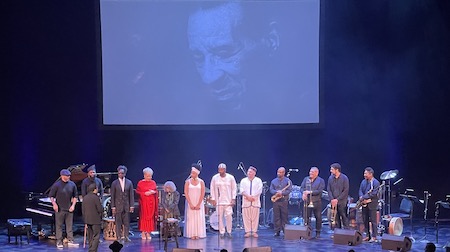Jan 13, 2026 2:09 PM
More Trump-Kennedy Center Cancellations
The fallout from the renaming of the John F. Kennedy Center for the Performing Arts to include President Donald…

The full cast of the centennial celebration for Max Roach, held Jan. 26 at New Jersey Performing Arts Center.
(Photo: Herb Boyd)Toward the middle of the lengthy centennial celebration for the great drummer and composer Max Roach (1924–2007) at New Jersey Performing Arts Center on Jan. 26, drummer Nasheet Waits delivered an impressive solo, one that conjured his iconic idol and extended his imaginative prowess. For many of us old-timers in the packed audience, it was easy to recall the revolutionary explosion of Max’s power on We Insist: Freedom Now Suite, an album that was like a musical soundtrack to the civil and human rights struggle for liberation in the 1960s. This memory was made all the more redolent and indelible when Waits was joined by Cassandra Wilson and her vivid evocation of vocalist Abbey Lincoln, particularly her keening screams and melodious ululations.
Wilson was even more commanding on “Driva Man,” her hurtful cries amplified by a band consisting of Ravi Coltrane and Jordan Young (saxophones), Luis Bonilla (trombone), Josh Evans (trumpet), Nduduzo Makhathini (piano), Eric Revis (bass) and a drum choir of Melvis Santa, Kweku Sumbry and Zafer Tawil; it was a collective jolt of the zeitgeist that Roach and his ensemble captured so rebelliously. Those who remember Coleman Hawkins’ tenor sax on the album may have relived that moment during Ravi’s insurgency and sound of freedom.
Oscar Brown’s lyrics on the album that Wilson reprised with verve and nuance were embellished by the poetry of Sonia Sanchez and her sonorous repetitions, Saul Williams, the Last Poets (featuring Abiodun Oyewole and Felipe Luciano) and Newark’s Mayor Ras Baraka, who rendered his father’s ode and hail to Max with similar resonance and energy. “Max is the highest/the outest, the largest, the fastest, the hippest, the all the way past which there cannot be,” Baraka recited at breakneck speed and clarity. “The poem was a catalog of jazz — that to Max was a four-letter word — that he ended with, “He is the mighty scarab, immortal as our music, world without end. Great artist universal teacher, and for any digger, one of our deepest friends? Hey, Max, Max, Max!”
The crowd responded with its chorus of hosannas, and it came close to the salute that was given to the opening rap/poetry of Vincent Toro, whose outfit was as resplendent as his words. According to Max’s son, Raoul, there will be practically a yearlong celebration of his father’s legacy, but it will be hard to surpass this evening of enlightenment and excitement. It almost replicates the original date and some of the passion that Nat Hentoff essayed in the liner notes. For them to capture the intensity and urgency of the original meant matching the genius of such notables as percussionist Michael Olatunji, trumpeter Booker Little and trombonist Julian Priester. This is no easy task, but the group renewed all those memories and musicality.
There were several moments when the festivities toned down and the spotlight focused on a drumset, signifying Max’s presence, that mystically complemented the performances. Much of the evening unfolded with images projected on the back wall by Alyson Shotz’s videography, and it was never more poignant and to the point than when Max came into focus. His brilliance was illuminated right up to the moment he made his celestial exit in 2007.
It was well past midnight when the last beat echoed and the evening morphed into a reception. If members of the band and other performers arrived there, it was long after several of us from New York were on the train back across the river, and back across unforgettable tracks of past and renewed memories of Max.
Included in the advertisement of the program was a quote from Max published in DownBeat in which he stated, “We American musicians of African descent have proved beyond all doubt that we’re master musicians of our instruments. Now what we have to do is employ our skill to tell the dramatic story of our people and what we’ve been through.” Max, it’s safe to say, would be proud of this latest rendition of his aim and purpose. DB

Belá Fleck during an interview with Fredrika Whitfield on CNN.
Jan 13, 2026 2:09 PM
The fallout from the renaming of the John F. Kennedy Center for the Performing Arts to include President Donald…

Peplowski first came to prominence in legacy swing bands, including the final iteration of the Benny Goodman Orchestra, before beginning a solo career in the late 1980s.
Feb 3, 2026 12:10 AM
Ken Peplowski, a clarinetist and tenor saxophonist who straddled the worlds of traditional and modern jazz, died Feb. 2…

The success of Oregon’s first album, 1971’s Music Of Another Present Era, allowed Towner to establish a solo career.
Jan 19, 2026 5:02 PM
Ralph Towner, a guitarist and composer who blended multiple genres, including jazz — and throughout them all remained…

Rico’s Anti-Microbial Instrument Swab
Jan 19, 2026 2:48 PM
With this year’s NAMM Show right around the corner, we can look forward to plenty of new and innovative instruments…

Richie Beirach was particularly renowned for his approach to chromatic harmony, which he used to improvise reharmonizations of originals and standards.
Jan 27, 2026 11:19 AM
Richie Beirach, a pianist and composer who channeled a knowledge of modern classical music into his jazz practice,…